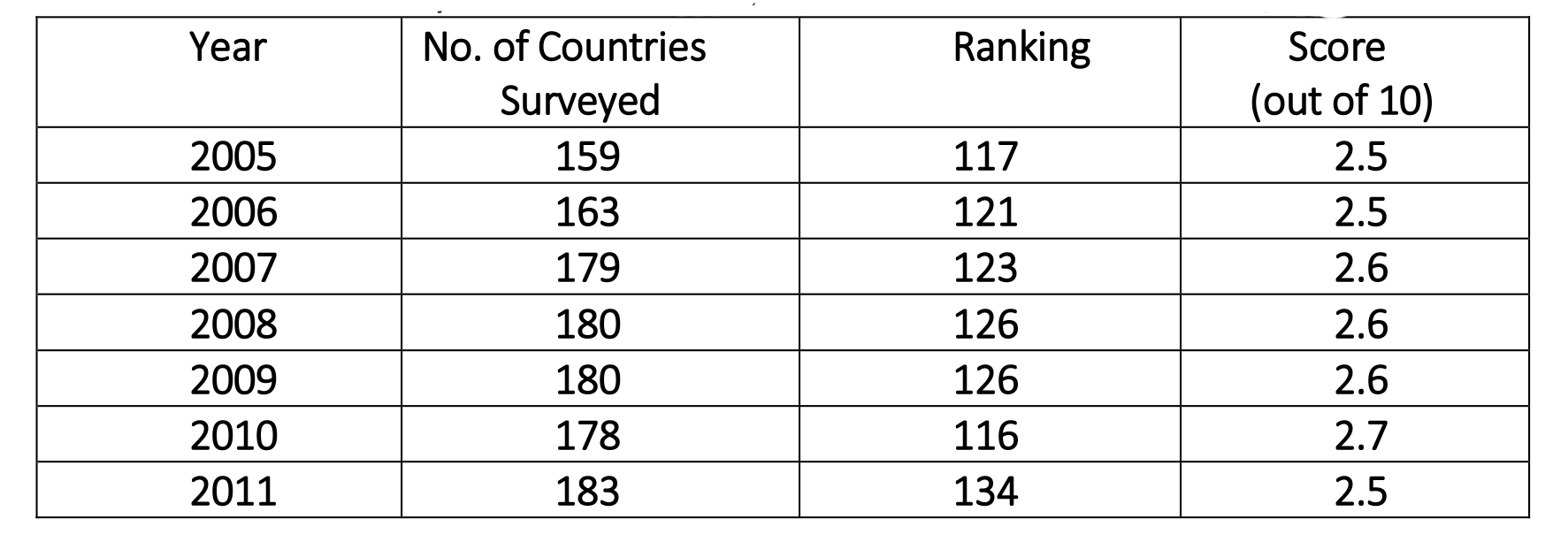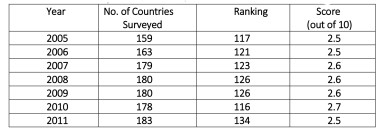Before proceeding with today’s article, a few days ago, it was reported that Transparency International released its Corruption Perceptions Index (CPI) for 2014. This is quite late, considering that in previous years the release was made in November – December for the year in question. This prompted me to recheck the date when the results for 2014 were released. That date was 3 December 2014. Readers may recall the articles I had written on 15 December 2014 and 22 December 2014 on the subject.
 Be that as it may, Guyana’s score was 30 out of 100 with a ranking of 124 out of 175 countries surveyed, representing a slight improvement on our performance in 2013. This was somewhat surprising, considering that 2014 was the year when unauthorized excess expenditure of $4.544 billion was incurred, resulting in the Court ruling that there has been a violation of the Constitution. Not only that, it was in the same year that the then President ill-advisedly chose to prorogue Parliament in response to a motion of no confidence on the Government, instead of dealing with the issue that gave rise to the motion.
Be that as it may, Guyana’s score was 30 out of 100 with a ranking of 124 out of 175 countries surveyed, representing a slight improvement on our performance in 2013. This was somewhat surprising, considering that 2014 was the year when unauthorized excess expenditure of $4.544 billion was incurred, resulting in the Court ruling that there has been a violation of the Constitution. Not only that, it was in the same year that the then President ill-advisedly chose to prorogue Parliament in response to a motion of no confidence on the Government, instead of dealing with the issue that gave rise to the motion.
Since 2005, Transparency International has included Guyana in the CPI assessment. Tables I and II show Guyana’s ranking and score. Prior to 2012, an earlier methodology and scoring system was used whereby countries were rated on a scale of 0 to 10. In 2012, the methodology and scoring system changed. Countries are now ranked on a score of 0 to 100.
Table I
Guyana’s ranking and score on the CPI (2005-2011)
Table II
Guyana’s ranking and score on the CPI (2012-2014)
To the extent that a dedicated and sincere effort is not made to establish the Public Procurement Com-mission and to appoint independent, and professionally and technically competent persons clothed with investigative and prosecuting powers to the membership of the Inte-grity Commission, our standing on the CPI is unlikely to significantly improve. With approximately 70% of the national budget dedicated to the procurement of goods and services and the execution of works, it is imperative that we have effective oversight of the public procurement processes, which is what the Commission is all about. Fourteen years would have elapsed since this constitutional provision was made. Despite this, the lacuna in procurement oversight continues to exist.
The Integrity Commission had not been functioning since the resignation of Bishop George in 2006, Even before then, the Commission was devoid of the requisite skills to conduct investigations where a public officer’s annual declaration did not appear to match his/her assets and lifestyle. It is public knowledge that several public officials continue to flaunt unexplained wealth with impunity.
In last week’s article, we discussed some of the issues raised before the Commission of Inquiry that has been appointed to, among others, “inquire into, report on, and make recommendations on the role, functions, recruitment, training, remuneration, conditions of service and other matters pertaining to personnel employed in the Guyana Public Service”. However, given space limitations, we were only able to discuss three issues, namely: (a) the filling of vacancies and the role of the Public Service Commission; (b) the award of scholarships; and (c) the Public Service Appellate Tribunal. Today, we continue our coverage of the work of the Commission.
Contracted employees
Two Permanent Secretaries spoke out against the system of employing persons on a contractual basis because of the absence of security of tenure of office and the associated demoralizing effect such a system has on employees. Article 201 of the Constitution makes it clear that it is the Public Service Commission that has the power “to make appointments to public offices, and to remove and to exercise disciplinary control over persons holding or acting in such offices”. The Constitution nevertheless allows for certain exceptions. For example, the personal staff of the President can only be appointed with his concurrence. Similarly, the PSC has to consult with the Clerk of the National Assembly before making any appointment to staff of the Assembly. In addition, the power of the Commission does not extend to the appointment of the
following: Solicitor General, Permanent Secretary, Secretary to the Cabinet, Ambassador, High Commissioner or other principal representative of Guyana in any other country or accredited to any international organization. All other categories of public servants are required to be appointed by the PSC.
Despite the above constitutional requirement, approximately 20% of public servants were employed on a contractual basis under the previous Administration. The actual numbers as per the 2012 Estimates of Revenue and Expenditure (excluding teachers, the Army and the Police) were as follows: Out of a total of 18,808 employees of Ministries/Departments/Regions, there were 3,806 contracted employees.
In effect, there were two public services operating parallel to each other. The first was the traditional public service comprising employees recruited through the PSC at set salary scales and other conditions of service. The second was the “parallel” public service, comprising handpicked persons employed on a contractual basis in most cases at emoluments and other conditions of service superior to those of employees in the traditional public service. Many of the contracted employees held senior positions and did not have the requisite qualifications and experience. This practice creates a demoralizing effect on the staff of the traditional public service in terms of their ability to progress within the organization. The structure is therefore in urgent need of dismantling and overhaul, and replacing with a unified public service comprising skilled persons operating in a professional manner and with a high degree of business management and customer orientation.
Political interference
One Permanent Secretary believes that: (a) the absence of political interference is key to a proper functioning public sector; (b) Permanent Secretaries should not in any way be politically involved; (c) they serve the Government of the day; and (d) governments come and governments go but public servants have rules to follow irrespective of which government is in place. I might add that Permanent Secretaries and other senior staff provide the institutional memory so vitally necessary in the transition from one Administration to another. If they choose to align themselves politically, especially to the extent of speaking at political platforms or being a candidate for national or regional elections, they run the risk of being replaced when there is a change in government. They simply cannot serve two masters at the same time.
There is evidence that under the previous Administration, some Ministers were micro-managing not only the operations of their Ministries but also those of statutory bodies and other entities for which they had ministerial responsibility. Even the appointment of the most junior staff member required the approval of not only the Minister but also the then Public Service Minister and the then Head of the Presidential Secretariat. Ministers of the Government are responsible for policy matters, and it is the Permanent Secretary and his/her staff who execute such policies. For statutory bodies and other agencies in which the State has controlling interest, it is the Board along with the management of the entity that are responsible for executing such policies. It follows that a Minister should not step down from his/her policy-making position and be involved in the implementation of policies and in in the day-to-day management of the organisation.
Training
One Permanent Secretary expressed the view that the Public Service needs to create a civil workforce that is flexible and capable of functioning in multiple capacities. He stated that an employee’s contribution will diminish over time if he/she remains in one position for too long. He suggested that a high level of political will, adequate training and flexibility in the system of management of civil service workers are necessary ingredients for an efficient public service.
The importance of training in the Public Service cannot be over-emphasised. Training is indispensable in order to provide for higher levels of performance and greater efficiency and effectiveness in the functioning of public services. Public servants also need to adopt a more business management approach and to be more customer-friendly. This is necessary to remove the perception, real or otherwise, that government operations are the least efficient and very bureaucratic.
Coupled with higher levels of training and experience, public servants need greater motivation to give of their best. Having said that, it is incumbent on all public servants, as a moral and ethical act, to lift the bar in terms of their own performance. They must no longer see themselves as merely going to work from 8.00 a.m. to 4.30 p.m., as opposed to working; staying within the rules; doing little or nothing; enjoying all the promotions by virtue of years of service; “retiring” five years before their effective dates of retirement; and enjoying handsome superannuation benefits at the time of retirement. That culture needs to radically change if we are to have a Public Service of which we can all feel proud.











